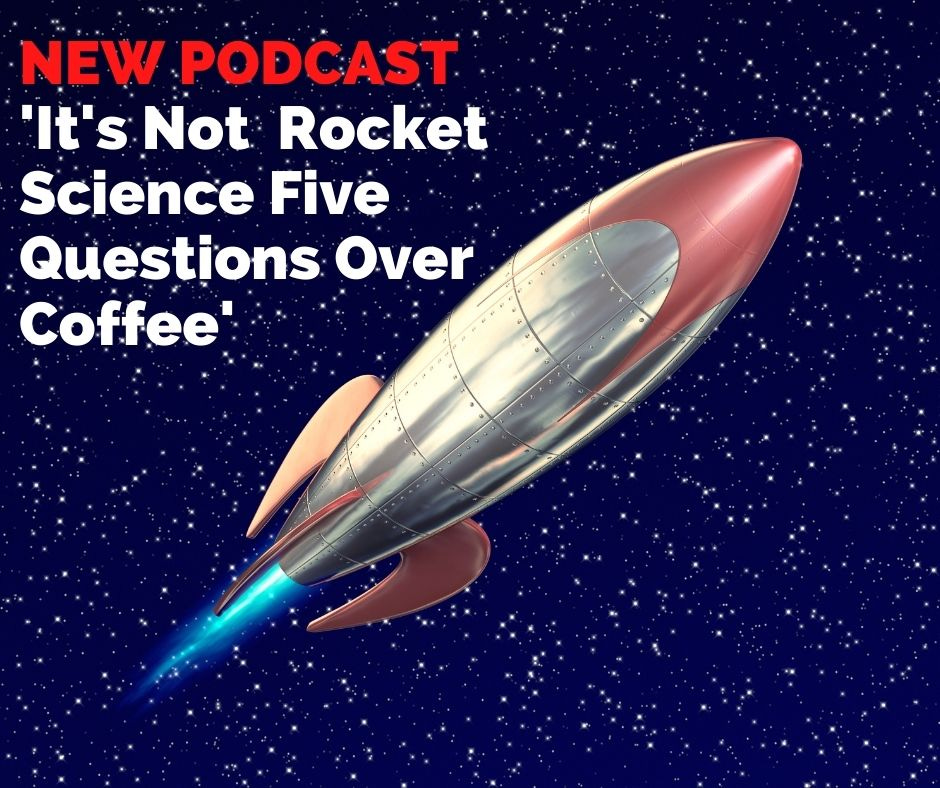Who is Tom?
Tom Spyt was a CardioThoracic Surgeon and University Professor but since his retirement has turned his experience to becoming an experienced Life Coach and Hypnotherapist. He helps people facing career change or retirement and those concerned with mental health issues.
Key Takeaways
Trauma is something that happens in our lives. 2:50
Lack of confidence comes from childhood trauma. 5:06
How do you help people with mental illness? 7:08
Thoughts create feelings and feelings lead to actions. 10:17
Engaging with thoughts about the past. 11:39
The metaphor of a railway station. 13:38
We are all experiencing changes in our mood. 17:16
What book or course would you recommend to the audience? 19:14
How to change your identity and purpose. 21:24
Valuable Free Resource or Action
http://thekindnessproject.co.uk/book/
A video version of this podcast is available on YouTube :
_________________________________________________________________________________________________
Subscribe to our newsletter and get details of when we are doing these interviews live at https://TCA.fyi/newsletter
Find out more about being a guest at : link.thecompleteapproach.co.uk/beaguest
Subscribe to the podcast at https://link.thecompleteapproach.co.uk/podcast
Help us get this podcast in front of as many people as possible. Leave a nice five-star review at apple podcasts : https://link.thecompleteapproach.co.uk/apple-podcasts and on YouTube : https://link.thecompleteapproach.co.uk/Itsnotrocketscienceatyt!
Here's how you can bring your business to THE next level:
If you are a business owner currently turning over £/$10K - £/$50K per month and want to grow to £/$100K - £/$500k per month download my free resource on everything you need to grow your business on a single page :
It's a detailed breakdown of how you can grow your business to 7-figures in a smart and sustainable way
————————————————————————————————————————————-
Transcript
Note, this was transcribed using a transcription software and may not reflect the exact words used in the podcast)
SUMMARY KEYWORDS
people, thoughts, trauma, tom, important, coaching, life, spending, veterans, talking, experience, consciousness, metaphor, brilliant, retirement, psychologist, depression, understand, engage, mailing list
SPEAKERS
Stuart Webb, Tom Spyt
Stuart Webb 00:18
Hi and welcome to It's not rocket science, five questions over coffee, I have my coffee in front of me at the moment I hope that Tom has as well. Today we're going to be meeting Tom spy Tom is a fascinating character, Tom will obviously give us some of his own history. But he was a cardiothoracic surgeon and professor, and spent a lot of his time helping medical students and his patients. But at retirement, he switched his focus and started to think about those people who are facing career change, retirement and mental health issues. And he's retrained as somebody who really thinks deeply about how those mental health issues affect those people. So, Tom, I'm really grateful for you to spend a few minutes with us, thank you so much for this, I'm thoroughly looking forward to this conversation.
Tom Spyt 01:06
Thank you, Stuart, I appreciate this opportunity. So because you, you said, I am recently retired cardiac surgeon, it did not happen immediately that I started to do what I do now. Retirement for professionals is, can be a challenge, because it is associated with the loss of identity and purpose. It doesn't only happen at the retirement, it happens also, when somebody is made redundant. If somebody comes to the end of the service in armed forces, these people whose identity and purpose and that's very often leads to a degree of depression. For me, and it took me about a year to to find myself again, I will tell you more later how I done it. So now
Stuart Webb 02:17
so what is it so what Tom, before you launch into that what what is it that you find that the people you help now have tried to do to address these issues on their on their own without any form of help and and how has that potentially not helped them?
Tom Spyt 02:34
Well, this takes her takes me to a little bit more to what they do. And as I said, as you introduced me, I deal with mental well being. Now trauma is something which is common. I work with veterans, British and Americans. And it's not about Battlefield trauma, you just trauma which happens in our lives. And it affects one in three of us, in one form or the other. And yet, this is the most the good note denied and belittled cause of human suffering. The difficulty here is that people we have a very different trauma. So one person may be look trivial for the other one. However, it's still very important. It doesn't matter how it feels for observers. What's important how it feels for an individual. Difficulty with for people with trauma is that there is a general reluctance to talk about it because it is ignored. It's denied. And furthermore, people who experience trauma quite often feel that they are responsible for it. The deal really caused it examples childhood trauma, or childhood abuse and for the abuser which happens so often. For instance in like rape, women who experience that feel responsible or they are made responsible for what happens to them. So the difficulty to reach out. Consequently, long term consequences of trauma are devastating and life long lasting example, a, quite a few of my veterans I work with, we just have Have them to transition from life in forces into civilian life. And they don't really often didn't know how to do it. Because they enlisted when they were still teenagers. Quite often in during conversations will turn, I discovered there were always who tell me eventually, oh, you know, I feel like impostor I, I can't do things I don't think I'm capable of. And what it is this lack of confidence comes from childhood. And this is a lack of closer relationship close bond between the primary caregiver, usually this biological mother doesn't have to be and a child. And the reason because the small person is doing our utmost to be loved to be closed, as if it's denied at this closeness. It starts doubting and doing my best. I can't do any anymore. And they grew up and it is it's not surprising. And I'm not put off by fact, when somebody who is in his 50s tells me, you know, do you think I really can get this job, we just say my dream job. So this is something important and you'll think about the extent of trauma, there's somebody in our family, amongst our friends or neighbours who suffered from this from from trauma. And also it will, you know, if your data comes from the United States, mainly, if one in five kids observed domestic violence in the one in the six, lift up, lived with the caregiver abusing alcohol. These are patterns, which will lead to inability to create to have loving relationships to continue domestic violence, Oh Is my father was doing it, it is okay for me to do it. Or it's okay to abuse children, girls in school or at latest later age. So these are issues which go far beyond Oh, just mental well being. That allows me to uncover a lot of areas, which that sort of intervention is not easily available. There's not enough psychologist or psychotherapist who can help me the circumstances. And of course, I'm not. I'm not securities, I'm very interested in psychiatry of trauma. And as a result of me studying it. And I'm certainly not a psychologist. So I hope that answers your question.
Stuart Webb 08:19
Tom, it's interesting that people suffer with this because of, of trauma in their childhood, how do you go about helping them to recognise and overcome this? What are the techniques
Tom Spyt 08:35
use not as technique is something which very few people know about. And what I'm going to tell you about is now there are rules how we all experience life, regardless of age, gender, race, language, culture, or religion. All eight billions of us experience life in exactly the same way. And the rules are constant, they always work like a gravity does. The others work even if we are not aware of them. So this simple explanation of how we experience life turns life's round, because it allows people to deal with depression and also with anxiety. How? What I'm talking about is three three principles. That's how we this cold in there in psychology are rare. I would say in the field of even psychotherapy. There are three principles principles of mind, consciousness and thought would be don't understand how important is how central is the thought, to our experience in life, we get an awful lot of thoughts during the day, about 10 to 30,000 of them, and they are all neutral. So there is no such a thing, oh, I keep on getting negative thoughts or I need to think positive. All thoughts to start neutral. And there's a metaphor out. You probably remember first time when you went to the cinema with your parents or siblings, very little person, and they were curious where the speakers are coming from, and eventually you turn back and you you notice this white flickering light? Well, to see the picture, there's got to be screen. And screen is a metaphoric description of consciousness or conscious awareness. And the picture is a thought, oh, pictures are just pictures to start. However, thoughts create feelings. There's no such a thing like, Oh, I feel one way or the other, if you look sad or depressed. Now there's got to be thought first. And the feelings lead to actions. And no actions, also some form of action. And all actions have caused the consequences we are responsible for. So when it comes to a depression, what is it? Well, actually, it's engaging with the thoughts about the past is 98. I was thinking about, Oh, that's such a fantastic job. And it's gone. How terrible it is. Yes, in this days, it felt terrible. I ended up being diagnosed with severe depression. Once I understood, there's actually this thoughts about the past, and the past is gone. I cannot undo it, I cannot make it any better. And that's how it is the same as with the future. I'm talking about anxiety, what is anxiety? It is engaging in thoughts about our imagination. Once we believe that the thought which came to our mind is true, wow, it becomes a reality. So what to do? Now some people say and when when I work with veterans who are very depressed, nearly suicidal, we talked about it. And I teach them how to get rid of those thoughts. Or let them go. Because those are like clouds, the paths? So how to do it from the in practical terms? Well, when you drive a car, you often listen to the music, some music, you like some music, you know? Like your thoughts? Well, you do belong to the musical station, you change it. There's no such thing that you become thoughtless. Immediately. next thought comes the other. If that doesn't appeal to you that sort of metaphor. Imagine yourself standing on the platform of busy railway station, like a new street in Birmingham. You're standing in trains stop in front of you, or things or thoughts, doors open. It doesn't mean that you go to a certain example which is third metaphor, which is appealing probably for the younger population is we all have got smartphones, and quite often we look at posts on the Facebook, Instagram or LinkedIn. And we spend about two or three seconds looking at the post and then we scroll so it comes into our mind. I noticed that I've seen it. I noticed thought about how fantastic was the past is gone. How fantastic moves, the relationship is gone. How close I was to my mother who passed away. Is this old true? But I don't have to engage in that sort of world. Who does how you Just a real practical advice. And that's how it works.
Stuart Webb 15:04
Tom, I love I love those analogies. And I love that you've given us such valuable free advice there in how not to engage in those self destructive thoughts. That's fantastic.
Tom Spyt 15:16
Well, it does. It does work, as I said to you. There's a lot is written on the rules of how we experience life. It is a term, which was coined by American philosopher called Sidney banks. And really, it is not a concept. It's not psychology or, or philosophy. That's the rules. And there's no way we can ignore them. Quite often, if Furthermore, it's possible to teach a little people about them, and they they understand it and understand it very well. Example. What's the consciousness? Well, consciousness is not binary. It's not that we are conscious or unconscious, of course, we've got to be conscious to, to be aware of the thoughts which come to our mind. However, consciousness has got the infinite number of levels. Like imagine a lift made out of glass, outside a skyscraper. And it goes up and down all day long, because that's what lifts to do. But it's the ground floor, it looks so the glass, it may not be necessarily quite nice picture of traffic, crowds, fumes. It may be some people you don't like the look of, but then it goes up. When it comes on, to the theatre, such as floor, you look through the same glass. Oh, it's so nice. I can see far away, it's peaceful and quiet. Well, as anything changed, it's exactly the same world. What it is what is important, the recognition of this is that we are all experiencing changes of our mood. Sometimes, we are in a not very good mood. And what is important to know that the moods are like, left, it will go up with a with us without us doing anything about it. There are certain conditions when it is impossible to make things better. If for instance, somebody is in a chronic, severe pain, that is impossible, without dealing with the pain first. What is what's the important when I was teaching this to my grandsons who were at the time, six and eight, and the next morning after our conversation, I was telling them, so what are you going to do if you are in a bad mood? Oh, and I think granddad is going to pass. So even the little people can understand that. And they can understand now, the importance of it is oh, they said there was a number of suicides among two teenage girls. Wow. How could they protect themselves? Understanding how we experience life that is the best protection and the only probably protection which comes from within not just regulating more and more different media. Yes, it is important is contributing. But for a teenager to understand that they what they experience may be just illusion.
Stuart Webb 19:12
Yes, yes. brilliant advice. I love it, Tom, that there must be a book or a course that you would recommend that the audience do some reading or thinking about that would help them to sort of understand some of what you've been talking about today. What What would you recommend?
Tom Spyt 19:31
I would recommend there is a American psychologist who spent a lot of time teaching people about it through a different programmes of crime prevention mainly. By the way I work with inmates. I correspond with them. And they are very responsive to what I have been talking about. They can rehabilitate not all of them, because some of them have got real psychopathic tendencies. And you cannot do anything to say government. But so what I would recommend, the author name is Jack pranskey. And the book to start with this, somebody should have told us, and it's a brilliant title. And when I read it, I thought somebody should have told me lie would have been so much easier. This book is also available in audio format. For those who, who prefer listening, because that's also very important to recognise that some of us are mostly visual, and some of us are predominantly auditory. That's helpful. I like audiobooks, because that makes going for a lot more interesting.
Stuart Webb 21:02
Brilliant stuff. Uh, Tom, I've asked you for questions. There must be a question that you think I should have asked, which I haven't. And so I'm now going to ask you to tell me the question that I should ask you, and then obviously, you're going to answer it for us and give us even more value?
Tom Spyt 21:24
Well, one of the things is, you could have asked me, How do you change? Like the question of someone who lost identity and purpose in life?
Stuart Webb 21:40
I do love the question.
Tom Spyt 21:44
Because that is there's a way and it's quite quick, easy way. And it's, it's the best is to do it in person, not always possible. So with the people who know. NLP, it's a, it's a more advanced than it would be, is possible to do it online. It's there is a different way of doing it. And that helps, helps people who are stuck as many of us are at some point in our lives. We don't need coaching all the time. However, any experience experienced there, any successful business person would have a coach from time to time. And then companies like Amazon provide free coaching for employees who wanted or encouraged it. And this, as I said, what I do with veterans, it's called mentoring, but in sent, in fact, it is it is coaching, too. So the mechanism already available. It's not a problem, the challenge of coaching is lack of awareness of how it works, and how it can benefit an individual.
Stuart Webb 23:13
Tom, Tom, I think you hit the nail on the head, so many people are not aware of what help they could get, and how they could overcome some of these and struggle too often on their own, don't they? And with that, I'm just going to put up this. scrolling across the bottom of the screen at the moment is where you can find more information about the sort of help that Tom gives. I'll just read it out for those people who are going to be listening to the audio. But it will be in the show notes. But it's www coaching and hypnosis. sanctuary.co.uk That's coaching and hypnosis. sanctuary.co.uk. Tom, you are a fascinating character with a fascinating history with some really brilliant things to say. I really do want to thank you so much for just spending a few minutes with us talking about some of this stuff. I know your time is valuable because you have so many people you're trying to help at the moment. So thank you so much for just spending a few minutes with us.
Tom Spyt 24:13
Oh, yeah, appreciate your station. Thank you, Stuart.
Stuart Webb 24:16
No problem Tom. Now, I'm just going to tell if you'd like to get onto our mailing list so that you can come and be sure that you get to catch up with really fascinating characters like Tom would you go to this link which is TCA dot FYI. So it's very simple TCA dot FYI, forward slash subscribe that gets you onto our mailing list. And we will email you once a week with who's gonna be on the link who's gonna be on the podcast this week. And also when it comes out as a further podcast, really interesting characters like Thomas spied, who will be he will be I'm sure. A valuable a valuable addition to your to your list if you can get on and look at his website. I'll just give you that one again, which is coaching and hypnosis. sanctuary.co.uk. Tom, thank you so much for spending a few minutes with us. I really do appreciate it. I know how valuable your time is. And I appreciate that you've been so willing to give so much value to people about how we can better address some of our some of our issues. So thank you so much.
Tom Spyt 25:24
Thank you, Stuart.
Stuart Webb 25:25
I'm just gonna play the intro. I look forward to seeing you all next week.











Share this post